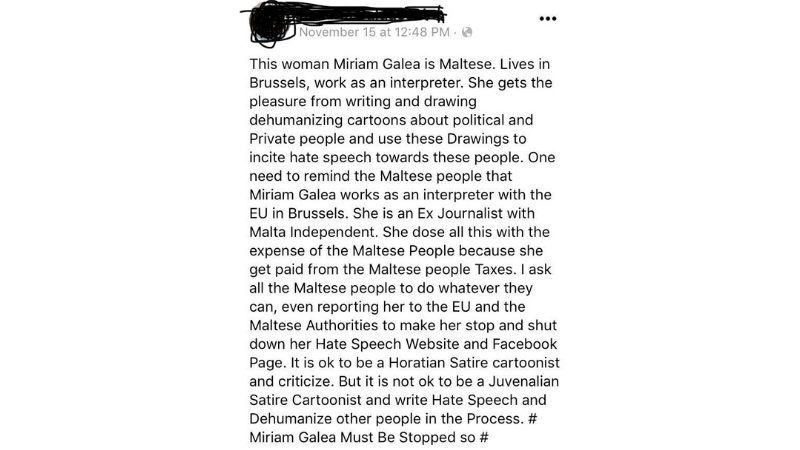The first rule of Zombieland: zombies eat brains. If you feel safe from them, it’s nothing to be proud of.
Then again, maybe safety is underrated. This legislature began with the assassination of Daphne Caruana Galizia, accused of being a hate blogger by people who called her a witch and a bitch, followed her in the street and tried various stratagems to strangle her financially.
The legislature is coming to an end with an orchestrated campaign against a private citizen, Miriam Galea, who two months ago began to post satirical cartoons on her Facebook page. She’s been accused of hate speech by people who called her a witch and a bitch. She’s been doxed (her personal details given out). Facebook was asked to close down her page. Her accusers want to get her shut down by her Brussels employer.
Between beginning and ending, we’ve had several journalists and activists mobbed and doxed. It has not been just foul rage. The campaigns have all the signs of real hate speech. They are characterised by harassment, networking and violations of digital privacy. Oh, and some campaigns have been traced to online Labour groups, with their leaders on the public payroll.
This is not a case of things remaining the same. On one measure, they’re getting worse.
Caruana Galizia was a journalist in the public eye with readers numbering in the hundreds of thousands. That doesn’t justify the way she was hounded, but it does make the ferocity of the response understandable: she was politically threatening.
Galea is (or was, until the backlash) a private citizen uploading satirical drawings for a restricted circle of FB friends. She had barely gathered a total of 1000 FB likes, over two months, when the onslaught came.
That’s what I mean by things getting worse. Now, even a private citizen, entertaining a few friends, cannot be allowed to get away with satire of the powerful. She lives in Brussels? She can be chased all the way there, too.
One of the main orchestrators against Galea has invoked a ‘principle’: People can practise what is conventionally called ‘Horatian satire’ (after the Roman satirist, Horace) but not ‘Juvenalian satire’ (after the Roman satirist, Juvenal). Huh?

Facebook post by one of the main agitators against cartoonist Miriam Galea, calling for her to be stopped by fair means or foul
Horace was insecure and afraid to name the powerful; Juvenal was not. Horatian satire is gentle; it aims for wry smiles. Juvenalian satire is political; it’s driven by anger and moral revulsion at corruption.
Even if you haven’t heard of him before, you’ve encountered Juvenal. He’s the one who accused his fellow citizens of being interested only in ‘bread and circuses’ while corruption was rife. Juvenal is the first who asked, “Who will watch the watchmen?” when saying the watchdogs may be corrupt, too.
“No satire like Juvenal’s” means: No matter your rights at law, do not comment on corruption, or we will set the zombies upon you. You may live in Brussels but do not assume you can live like them, a free citizen.
You may engage in satire, but only like a court jester: with permission. You may make us smile. But you have no right to express your anger. You may not point your finger at us.
You have the right to a quiet life only if you keep quiet. Keep your brains, but strictly for private use. Avoid drawing the attention of partisan zombies roaming the cyber city.
Then you may hope for a zombie job — neither real nor unreal — one of thousands being dished out. Or a zombie contract, issued by a zombie committee or through the direct order of a minister who, having survived scandal, damning reports by State authorities and stern court judgements, must be a zombie, too.
You can then enjoy the fruits of living in a zombie economy. It sells passports to zombie citizens. It’s grey, now, with tiny bits of flesh dropping off as companies leave. It has growing uncertainty about when zombie contractual clauses — in those zombie power-station or hospital deals — will pop out of their unmarked grave and bite the life out of your salary.
Relax in our zombie environment, where agricultural land disappears and a communal bay stiffens into a marina. Don’t resist the benefits of zombie-hood if you’re going to bear the costs anyway — a zombie home, when towers rise up around it to plunge it into semi-darkness and kill your house-plants, or when a zombie foundation suddenly claims the land on which your house is built.
As a zombie you are welcome in public life. You may hope to enter that undead institution, Parliament, and sit on zombie committees that cannot fulfil the functions they were set up for.
Should you engage in gross misbehaviour, you may rely on zombie rulings and zombie letters of reprimand. You’ll be safe. The Speaker will never say zombies are ubiquitous.













Ranier has done it again with a superb piece.
When will the international community stand up to the Zombies and protect the citizens who dare to challenge because it is clear that in Malta they have the freedom to breed at will and roam as and where they like with impunity.
“The Speaker will never say zombies are ubiquitous.” Because he cannot even pronounce the bleeding word, so he will try and screw it up as he does with everything else.
Spot-on, except check your spelling 🙂
Zombie films are no longer fiction.
This piece hit me deep. The life of a fisherman who stands up to power and corruption fits perfectly. A luzzu is painted black and there are placards. The fisherman is a threat to the fishing sector and to society at large! He must be stopped. The warfare strategy is well known; attack, discredit, humiliate, degrade, dehumanise, isolate. The fisherman is weakened. A fearless journalist is blown up. A luzzu is forcefully taken away from the fisherman. His life is in tatters but he tries to stay alive and fight on. Weak and frail he carries his load to the Palace of Justice. He is afraid because the palace is overwhelmed. He empathises with the man handling the bags but he almost feels unwelcome. It is very difficult to live where “zombies are ubiquitous”.